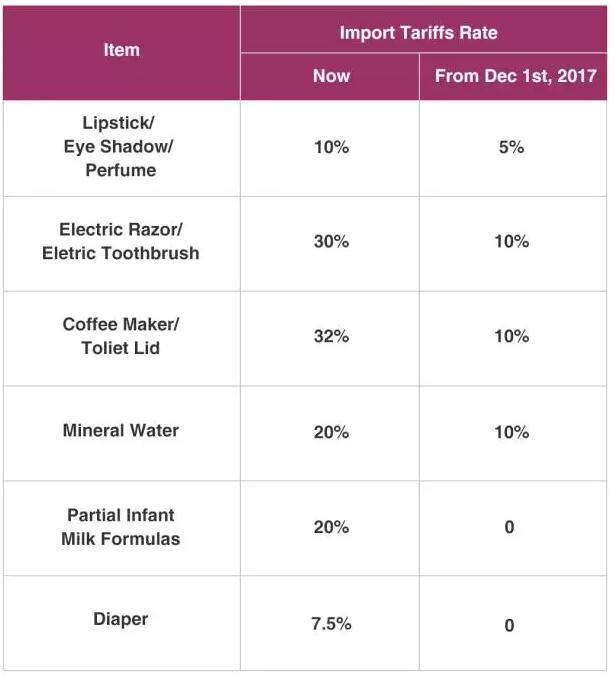China to Cut Tariffs, Making Imported Goods Much Cheaper!
China’s Ministry of Finance has said it will cut import tariffs on consumer products, as part of a drive to lower costs and spur domestic consumer spending.
For traders, sending goods to China costs much less. For consumers, there are almost 187 types of imported products will be much cheaper to buy.

The move, which takes effect on Dec. 1st, will see deep cuts to import tariffs on 187 imported products.
After the cut, tariffs on the consumer products–which also include apparel, food, health supplements, cosmetics, household equipment, pharmaceuticals and recreational products–will average 7.7%, down from the current 17.3%.

These imported products have a great market in China
Since people’s consumption demands are ever increasing, the tax cut will benefit the choices available to consumers domestically, and help upgrade the domestic supply system. The great demand for imported products is generally divided into five categories by consumers.
The youths
This consuming group is the spokesman of fashion, have a great potential for consuming luxuries, and they are more willing to spending money investing in their self-beauty.
The huge import tariffs cut on cosmetics, hairdressing supplies, oral care products, make-up tools, case and bags, clothing, footwear is no doubt an amazing news to encourage the youths to buy more.
The housewives
Couple years ago, this group of people liked going to Hong Kong to buy the infant milk formulas, diapers, and daily products.
In recent years, the advantage of exchange rate becoming less obvious and the intense relationship between residents in two regions becomes the root cause for this type of people switching their consuming place from Hong Kong to neighborhood countries, like Japan and South Korea. In 2015, Japan attracted a bunch of Chinese to go there and grab the country's toilet lids and rice makers!
This trend may stop soon. From December 1st, the import tax for partially and fully hydrolyzed formula milk, amino acid formula milk and lactose-free formula milk is to be reduced from 20% to zero. Tax on baby diapers is also to be reduced from 7.5% to zero.
The white collars
The income of this consuming group can support them to chase a higher life quality. They are more willing to spending money on products which can give them a better lifestyle.
The deep tariffs cut on recreational products, coffee maker, bread makers, fitness equipment, household equipment, and healthy food like cheese, nuts, seafood etc... will drive the niche market to become bigger.
The whiskey lovers
China's move was welcomed by Scotch whiskey producers, who will see their tariff fall from 10% to 5%. In the first six months of 2017, demand for Scotch in China jumped as the economy grew, with direct imports alone up 45% to 27 million GBP.
A cut in tariffs will give another welcome boost to Scotch and will encourage the premium Scotch whiskey market to continue to expand.
The elders
Another consuming group of the imported products will be the elders, they pay more attention to health and hygiene. Mostly, they are willing to spending money on healthcare product and medicines.
Generally speaking, it is the fourth times China gives a huge tariff cut on imported products since 2015. It covers a wide range of items.
Imports through general trade are much safer
With Beijing’s repeated commitment to encouraging imports by cutting tariffs, the days of the shopping agents’ booming e-commerce, and the so-called "daigou" business may be numbered.
E-commerce in China keeps expanding at a fast speed. About 42 million Chinese bought foreign products via cross-border e-commerce platforms last year, spending about 1.2 trillion yuan (280.78 billion USD).
According to the Hangzhou-based China Electronic Commerce Research Centre. That number is expected to reach 59 million shoppers this year, with a purchase value of 1.85 trillion yuan.
Cao Lei, director of the research center said that the tax cuts will add to the advantage of e-commerce operations over the online shopping agents, imports through general trade are much safer in terms of customs clearance, quarantine, and warehousing.
Counterfeit concerns
Since the Chinese market craving for foreign products, counterfeit problems also raise the public's concerns.
China still has a problem with counterfeit products, as long as consumers still do not have confidence in buying goods made by the Mainland, they more prefer buying imported products.
Consumers may wrongly take imported products as the guarantee against counterfeits, most of the consumers do not have the ability to tell the counterfeits. It would be a further step for the Chinese market to fight against the counterfeits. And consumers should learn more about how to tell the fakes.
Reference: BBC, SCMP, Chinadaily
Latest Information
- China to Cut Tariffs, Making Im
- China's New Work Visa System
- Enter or Leave China, You Must
- Latest! HK Company Profits Tax
- Important Notice of Chinese Wor
- From April 1st onwards, Hongkon
- 2018 New Trading Policies You S
- These Foreigners Need More Docu
- CHINA IS NOW THE HUB OF GLOBAL
- How to Apply for Different Type



